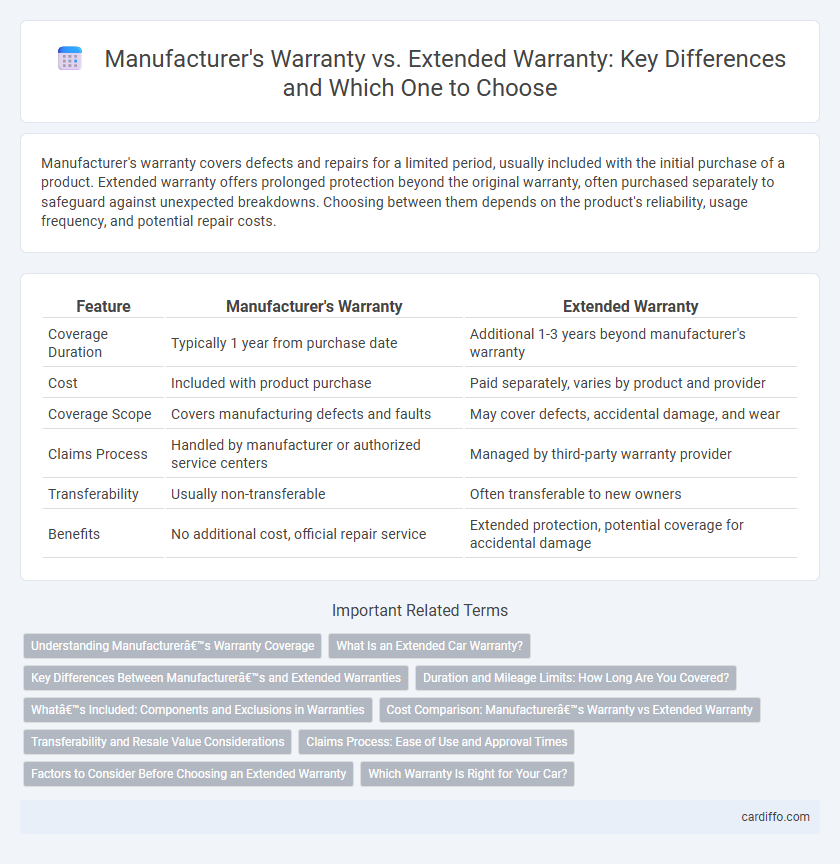Manufacturer's warranty covers defects and repairs for a limited period, usually included with the initial purchase of a product. Extended warranty offers prolonged protection beyond the original warranty, often purchased separately to safeguard against unexpected breakdowns. Choosing between them depends on the product's reliability, usage frequency, and potential repair costs.
Table of Comparison
| Feature | Manufacturer's Warranty | Extended Warranty |
|---|---|---|
| Coverage Duration | Typically 1 year from purchase date | Additional 1-3 years beyond manufacturer's warranty |
| Cost | Included with product purchase | Paid separately, varies by product and provider |
| Coverage Scope | Covers manufacturing defects and faults | May cover defects, accidental damage, and wear |
| Claims Process | Handled by manufacturer or authorized service centers | Managed by third-party warranty provider |
| Transferability | Usually non-transferable | Often transferable to new owners |
| Benefits | No additional cost, official repair service | Extended protection, potential coverage for accidental damage |
Understanding Manufacturer’s Warranty Coverage
Manufacturer's warranty typically covers defects in materials and workmanship for a specific period, often ranging from one to three years, providing free repairs or replacements within this timeframe. Extended warranty enhances this coverage by offering additional protection beyond the manufacturer's original terms, sometimes including accidental damage or longer duration. Understanding manufacturer's warranty details, such as coverage limits and claim procedures, is crucial before considering an extended warranty purchase.
What Is an Extended Car Warranty?
An extended car warranty is a service contract purchased separately from the original manufacturer's warranty, providing coverage beyond the initial period. It covers repairs and maintenance not included in the standard warranty, often extending protection for key components like the engine, transmission, and electrical systems. This type of warranty offers added peace of mind by reducing out-of-pocket expenses for unexpected vehicle repairs after the manufacturer's warranty expires.
Key Differences Between Manufacturer’s and Extended Warranties
Manufacturer's warranties typically cover defects in materials and workmanship for a limited period, starting from the date of purchase, ensuring repair or replacement at no cost. Extended warranties offer additional coverage beyond the manufacturer's warranty, often including protection against accidental damage and mechanical failures for a longer duration, usually at an extra cost. Key differences include coverage scope, duration, cost, and the provider, with manufacturer warranties being standard and free, while extended warranties are optional and purchased separately.
Duration and Mileage Limits: How Long Are You Covered?
Manufacturer's warranty typically covers a vehicle for 3 to 5 years or 36,000 to 60,000 miles, providing comprehensive protection against defects in materials and workmanship. Extended warranty plans often extend coverage beyond these limits, lasting up to 10 years or 100,000 miles, depending on the provider and selected package. Understanding the duration and mileage limits helps buyers choose the right level of protection tailored to their driving habits and vehicle usage.
What’s Included: Components and Exclusions in Warranties
Manufacturer's warranty typically covers defects in materials and workmanship for specific components such as the engine, transmission, and electrical systems, excluding wear-and-tear parts like brake pads or tires. Extended warranty plans often expand coverage to include additional components, routine maintenance, and sometimes roadside assistance, but may exclude pre-existing conditions and damage caused by misuse or accidents. Understanding detailed exclusions and covered parts is crucial for comparing the value and protection offered by each warranty type.
Cost Comparison: Manufacturer’s Warranty vs Extended Warranty
Manufacturer's warranty typically comes at no extra cost with the purchase of a product, covering defects and repairs for a set period, often one year. Extended warranties require an additional purchase, ranging from 10% to 30% of the product's price, with coverage periods that extend beyond the manufacturer's warranty. Cost comparison reveals that while the manufacturer's warranty offers basic protection with no upfront expense, extended warranties provide longer coverage but may not always justify their higher costs depending on product reliability and repair likelihood.
Transferability and Resale Value Considerations
Manufacturer's warranties typically offer limited transferability, often only covering the original purchaser, which can reduce the resale value of the product. Extended warranties frequently provide transferable options for an additional fee, making the item more attractive to potential buyers by ensuring continued coverage. Evaluating the transferability of both warranties is critical for maximizing resale value and long-term protection.
Claims Process: Ease of Use and Approval Times
Manufacturer's warranty usually offers a more streamlined claims process with faster approval times due to direct manufacturer oversight and standardized procedures. Extended warranty claims often involve third-party administrators, which can introduce additional steps and longer wait periods for claims approval. Customers benefit from quicker resolutions under manufacturer warranties, while extended warranties may provide broader coverage but potentially slower claims processing.
Factors to Consider Before Choosing an Extended Warranty
Evaluating factors before choosing an extended warranty involves assessing the manufacturer's warranty coverage duration, the cost and terms of the extended plan, and the likelihood of needing repairs based on product reliability data. Consider the extended warranty's inclusion of accidental damage protection, service convenience, and authorized repair network availability to ensure value. Analyzing product reviews, historical repair frequency, and the extended warranty provider's reputation aids in making a cost-effective decision.
Which Warranty Is Right for Your Car?
Manufacturer's warranty typically covers defects and repairs for a limited time or mileage, providing essential protection during the initial ownership period. Extended warranty offers prolonged coverage beyond the manufacturer's terms, often including additional services like roadside assistance and more comprehensive repairs. Choosing the right warranty depends on your car's age, driving habits, and budget, with newer vehicles benefiting from manufacturer warranties and older or high-mileage cars gaining value from extended plans.
Manufacturer's Warranty vs Extended Warranty Infographic

 cardiffo.com
cardiffo.com